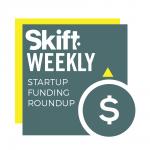Skift Take
This week, we cover funding news from BookingKit (which makes software for tours-and-activities operators), Rotamundos (a budget hotel brand in Mexico), Izy (which provides contactless tech to hotels), Hotelbreak (which lets hotel sell services to non-guests), and Dorma (which rents vacation apartments to Italians).

Travel Startup Funding This Week
Each week we round up travel startups that have recently received or announced funding. Please email Travel Tech Reporter Justin Dawes at [email protected] if you have funding news.
This week, travel startups announced more than $7 million in funding.
>>BookingKit, which provides software to tours-and-activity operators, raised an undisclosed round of funding. The Deutsche Startups podcast said the investment was about $6 million (€5 million).
Past backers Intermedia Vermögensverwaltung, Müller Medien, and High-Tech Gründerfonds (HTGF) participated, along with other investors.
Bookingkit, which helps “experiences” operators manage, sell, distribute, and market their services, is believed to have raised more than $15 million since its founding in 2014. The Berlin-based startup has focused on the German, Austrian, and Swiss markets, distributing thousands of listings for experiences, activities, and attractions in Europe to online aggregators and travel agencies like GetYourGuide and Ctrip.
>>Rotamundos, a social hotel chain based in Mexico, has raised $1.4 million in seed financing, with the possibility of expanding this capital before the end of the year.
Rotamundos echoes some aspects of the business models of Colombia-based Ayenda, India-based Oyo, and Panama-based Selina.
Rotamundos pinpoints existing real estate in locales outside of the major tourist meccas and invests in refurbishing and redecorating them, training staff, and providing online reservation technology and soft branding.
The company is signing up hotels, cabins, and hostels in a few dozen rural tourist destinations in Mexico, with lodging ranging from spare family accommodations a night to small boutique hotels at about $235 (5,000 pesos) a night.
Javier Cárdenas, who launched and sold the Orcius digital marketing business, founded the startup. Part of Cárdenas’ plan is to help the lodging appear in the leading global travel search engines, such as Kayak or Booking.com, along with Rotamundos’s site.
Sample lodging includes Rotamundos Forest Cabins in San Miguel Regla, near Huasca, in Hidalgo, and about three hours from Mexico City. The brick and wood cabins have a fireplace, a garden, and a nearby restaurant. Local activities include horseback rides and ATV rides.
>>Izy, a contactless mobile concierge platform for hotels, said it had recently closed an unspecified seed round.
The startup raised money from Indigo by Telkom Indonesia and Arkblu Capital. It participated in the Accelerating Asia startup mentorship program, which also invested.
The company helps hotels to digitize all their services and upsell guests on ancillaries. Despite the crisis, the company has continued to receive hotel inquiries from Indonesia, Singapore, Malaysia, Vietnam, India, and elsewhere.
>>Hotelbreak, a Spain-based company that helps hotels sell services to guests who aren’t staying overnight, has raised $370,000 (€310,000) from angel investors and venture capitalists.
Hotelbreak can offer tourists who are already at destinations and locals who live nearby access their amenities and services during the day without booking a room. Options include day passes to spa access and restaurant meals on rooftop terraces.
Hotelbreak recently debuted in Portugal at a Hilton hotel, after having served 6,000 customers at hotels in Spain. It focuses on full-service hotels catering to leisure travelers, said co-founder Maxime Renaudin.
>>Dormoa, a vacation rental listing service, has raised about $325,000 (£285,000) in a seed funding round, as first reported by Short Term Rentalz.
The company aims to offer thousands of curated vacation holiday apartments in Italy to Italians. It tries to reach Italians with marketing campaigns targeted to the particular needs and cultural tropes of the country’s different regions.
Skift Cheat Sheet:
We define a startup as a company formed to test and build a repeatable and scalable business model. Few companies meet that definition. The rare ones that do often attract venture capital. Their funding rounds come in waves.
Seed capital is money used to start a business, often led by angel investors and friends or family.
Series A financing is typically drawn from venture capitalists. The round aims to help a startup’s founders make sure that their product is something that customers truly want to buy.
Series B financing is mainly about venture capitalist firms helping a company grow faster. These fundraising rounds can assist in recruiting skilled workers and developing cost-effective marketing.
Series C financing is ordinarily about helping a company expand, such as through acquisitions. In addition to VCs, hedge funds, investment banks, and private equity firms often participate.
Series D, E and beyond These mainly mature businesses and the funding round may help a company prepare to go public or be acquired. A variety of types of private investors might participate.
The Daily Newsletter
Our daily coverage of the global travel industry. Written by editors and analysts from across Skift’s brands.
Have a confidential tip for Skift? Get in touch
Tags: funding, startups, vcroundup
Photo credit: A visitor to the Museum der Illusionen in Vienna, Austria, plays an optical trick on the camera thanks to a cleverly designed room. The museum uses BookingKit's central booking and administration system. BookingKit has just raised additional funding. Museum der Illusionen
